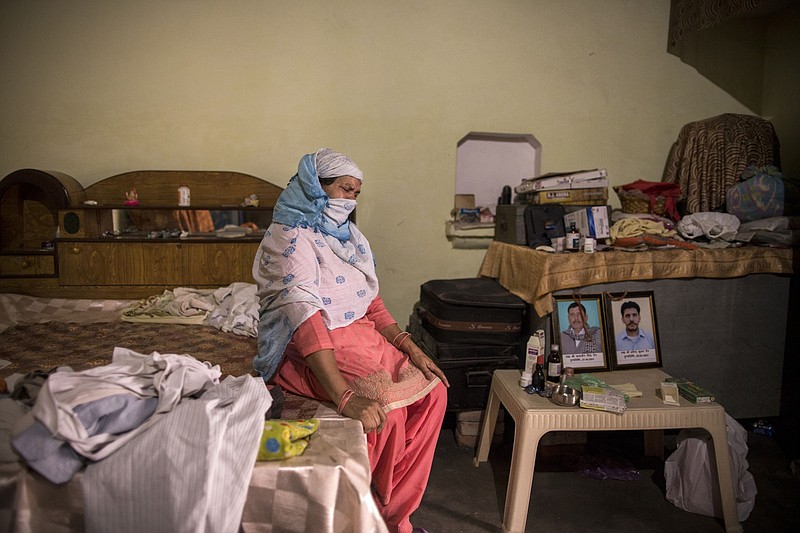After devastating India's biggest cities, the latest coronavirus wave is ravaging rural areas across the world's second-most populous country. And most villages have no way to fight the virus.
In Basi, about 1½ hours from the capital, New Delhi, about three-quarters of the village's 5,400 people are sick and more than 30 have died in the past three weeks. The village has no health care facilities, no doctors and no oxygen canisters.
"Most deaths in the village have been caused because there was no oxygen available," said Sanjeev Kumar, the newly elected head of the farming community. "The sick are being rushed to the district headquarters and those extremely sick patients have to travel about four hours," he said, adding that many don't make it in time.
In interviews with representatives from more than 18 towns and villages in different parts of the country, officials outlined the scale of the carnage. Many people said the scale of the crisis is much bigger than official numbers reveal, with villagers afraid to leave their homes even if they have fevers and local authorities failing to properly record virus fatalities.
[Video not showing up above? Click here to watch » https://www.youtube.com/watch?v=LpuX16OOxhc]
India reported a record 4,329 deaths on Tuesday, while its total reported cases topped 25 million, according to figures from the Health Ministry.
The numbers continue a trend of falling cases after infections dipped below 300,000 for the first time in weeks on Monday. Active cases in the country also decreased by more than 165,000 on Tuesday -- the biggest dip in weeks.
India has recorded nearly 280,000 virus deaths since the pandemic began. Experts warn that both the number of deaths and total reported cases likely are vast undercounts.
Anger is building both at Prime Minister Narendra Modi's administration and local authorities for failing to bolster medical infrastructure after a virus wave last year, including securing sufficient supplies of oxygen and vaccines. The ruling Bharatiya Janata Party last month lost local elections in Basi and other parts of Uttar Pradesh -- India's most populous state -- just as the country started recording almost 400,000 new cases a day.
The sentiment on the ground suggests broader troubles for Modi and fellow party leader Yogi Adityanath, the chief minister of Uttar Pradesh who has been mentioned as a possible successor to the prime minister. The state holds elections next year.
During the recent election to appoint village heads, many poll workers became infected.
Representatives from both the prime minister's office and the Health Ministry have not responded to requests for comment. Modi addressed the issue on Friday after a meeting with several chief ministers. "I want to warn you about corona. The infection is spreading fast in villages," the prime minister said. "Efforts are being taken to deal with this."
In Punjab, a northern state bordering Pakistan, authorities are asking volunteers among India's 1-million-strong Accredited Social Health Activists to visit every house to urge people to get vaccinated and see if anyone has a fever. While the group is well known for working in harsh conditions to deliver childhood immunizations and basic first aid to villages, the scale of the current crisis is unprecedented, said Balbir, one of the workers.
"Many people are so scared they are not even telling anyone about their fever," she said, asking to be identified by only her first name over fear of a backlash from authorities in Ludhiana district, where infections are spreading rapidly. "Despite such a huge surge they have still not given us adequate protection: no masks, no gloves, nothing."
Uttarakhand has also been hit hard. Cases in the state in the Himalayan foothills jumped almost 20 times after it hosted more than 9 million people for the Hindu religious festival known as the Kumbh Mela between March 31 and April 24.
"There isn't a house in Rishikesh where people aren't sick -- Haridwar is also in a similar condition," said Navin Mohan, who helps arrange tours to the holy towns on the banks of the Ganges.
"The pandemic is now truly beyond control," Mohan said. "Thousands are dying and will die in the next few weeks. The government is fudging numbers, but the reality is visible to everyone."
Information for this article was contributed by Sudhi Ranjan Sen, Bibhudatta Pradhan, Shruti Srivastava and Ruth Pollard of Bloomberg News (WPNS); and by staff members of The Associated Press.





